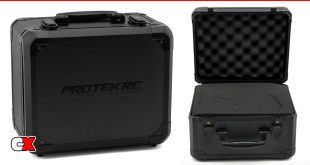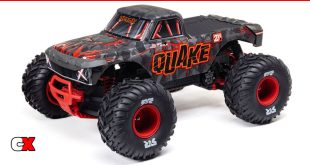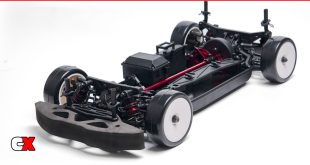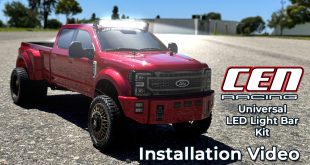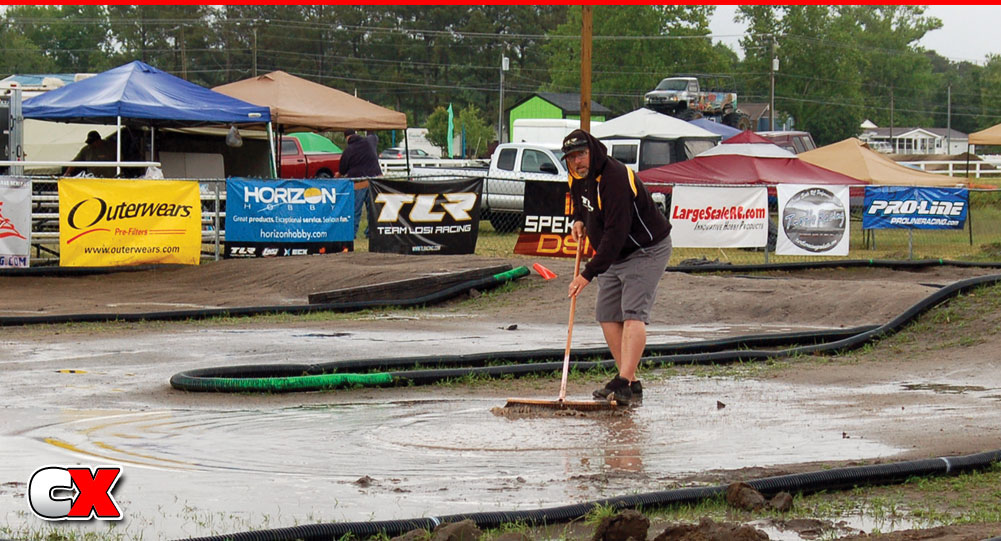
Digger’s Dungeon, home of the infamous Grave Digger Monster Truck, was once again the host of the 2013 East Coast Large Scale Nationals. Set on the actual Grave Digger facility in North Carolina, this event pulled in an impressive 180+ drivers from all over the country—heck, even I was there from Southern California! This was my second time covering this event and, as usual, I had a tremendous time! I have to say that not only is the race itself one of the best to attend, but the people are next-level nice.
THE PLACE
Digger’s Dungeon is definitely one of the coolest locations to hold an RC event. There are two fantastic RC tracks, a full-on Grave Digger merchandise shop, a petting zoo and a small, single lane track where the kiddies can ride Grave Digger Power Wheels! There is also an amazing little diner aptly named Digger’s Diner, where breakfast and lunch are served in a shop decorated with trashed Grave Digger parts! It’s AWESOME!
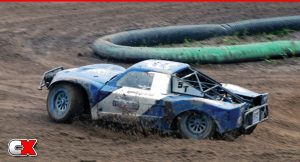 THE TRACK
THE TRACK
The boys at Digger’s (headed up by Chief Uber-Cool Guy, Henry Cross) dug up a tight, technical off-road track that was sure to test both the horsepower and handling of the big 1/5-scale trucks. A normal lap of the track went something like this: blast down the long straightaway which had a large tabletop jump three quarters of the way down. The fast guys would hit this jump with just enough speed to crest and downside the back. Everyone else bombed it like it was a long-jump contest. The straight led into a left-hand sweeper that filed to the back of the track. However, it was squared off with a small bump-jump through the center. The sweeper exited into a ripple section that consisted of five 2×4’s buried in the dirt. There were many lines through this section, but none of them were fast…and if you did make it through fast, it was pure luck. This section was pretty difficult and it not only tested your suspension setup, but also was the make-or-break part of a fast lap. At the end of this section was a hairpin switchback to the left that ran about 30 feet to another hairpin switchback to the right. This put you onto a short straight that had three jumps in it; a small jump, leading into a medium jump, leading into a larger jump. Because of the size difference (and the distance between them), there was no way to turn these into a double or triple jump. This section, too, was a bit tricky but made for a good passing zone. After the third jump, there was another hairpin switchback to the right, leading to a final, elevated hairpin switchback to the left. The elevation change was up to a sort of platform. Hit it just right and you could whip around the hairpin and back down to the flat ground. Hit it too fast and you were sliding off the back side of the platform. It was tricky and it caught quite a few people off guard during the race, especially if you tried to make a pass here. The platform led down to another squared-off sweeper that took you back to the main straight. Other than another bump-jump through the sweeper, there was nothing else built into the track for the drivers to navigate…until the rains came. That caused the short straight just after the platform to rut up like nobody’s business, creating a crater minefield that had cars flipping and bucking like it was a wild rodeo. The only fast lines were the extreme inside (risky because of the boards lining the track lanes) and the extreme outside (risky because of the chain link fence). The fast guys were able to hit those lines pretty consistently, while most everyone else went straight for the rodeo section. All that in one lap…and we did 44 laps in the main.
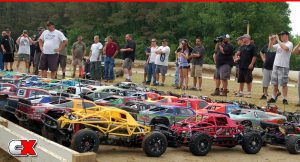 The oval track was a work of art. I know what you might be saying…it’s a piece of land that has a round track in it with grass in the center…whoop-de-doo. You’d only be partially right. It was a piece of land with dirt, but not just dirt…clay that was smooth as glass and had oodles of traction! This super-smooth track was lined on the outside by a four-foot retaining wall and on the inside by a two-foot ‘bumper’ wall. Any out-of-control cars (or anything spinning out) would hit this inside wall and need to be marshaled, but that was a much better option than not having a wall and allowing 35-pound cars to jet across the middle (or cut the corner) and endanger the turn marshals. A typical lap around this track went something like this: head down the front straight at Mach 10 speeds. Turn left going into the sweeper and letting the back end start to hang out. While managing the perfect steering/throttle combo, keep the 1/5-scale in a perfect drift through the turn, exiting with maximum speed. You would then fly down the back stretch (again, hitting Mach 10) and follow the same procedure as in the first sweeper. Yes, that’s it. That’s one lap. While it does sound easy, you have to remember there are nine or ten other cars on the track that may not find it easy, so your line through the sweepers (and entry points into them) would change every lap. Speeds were blisteringly fast and traction was amazing, and it was one of the funnest types of racing I’ve done in a long time!
The oval track was a work of art. I know what you might be saying…it’s a piece of land that has a round track in it with grass in the center…whoop-de-doo. You’d only be partially right. It was a piece of land with dirt, but not just dirt…clay that was smooth as glass and had oodles of traction! This super-smooth track was lined on the outside by a four-foot retaining wall and on the inside by a two-foot ‘bumper’ wall. Any out-of-control cars (or anything spinning out) would hit this inside wall and need to be marshaled, but that was a much better option than not having a wall and allowing 35-pound cars to jet across the middle (or cut the corner) and endanger the turn marshals. A typical lap around this track went something like this: head down the front straight at Mach 10 speeds. Turn left going into the sweeper and letting the back end start to hang out. While managing the perfect steering/throttle combo, keep the 1/5-scale in a perfect drift through the turn, exiting with maximum speed. You would then fly down the back stretch (again, hitting Mach 10) and follow the same procedure as in the first sweeper. Yes, that’s it. That’s one lap. While it does sound easy, you have to remember there are nine or ten other cars on the track that may not find it easy, so your line through the sweepers (and entry points into them) would change every lap. Speeds were blisteringly fast and traction was amazing, and it was one of the funnest types of racing I’ve done in a long time!
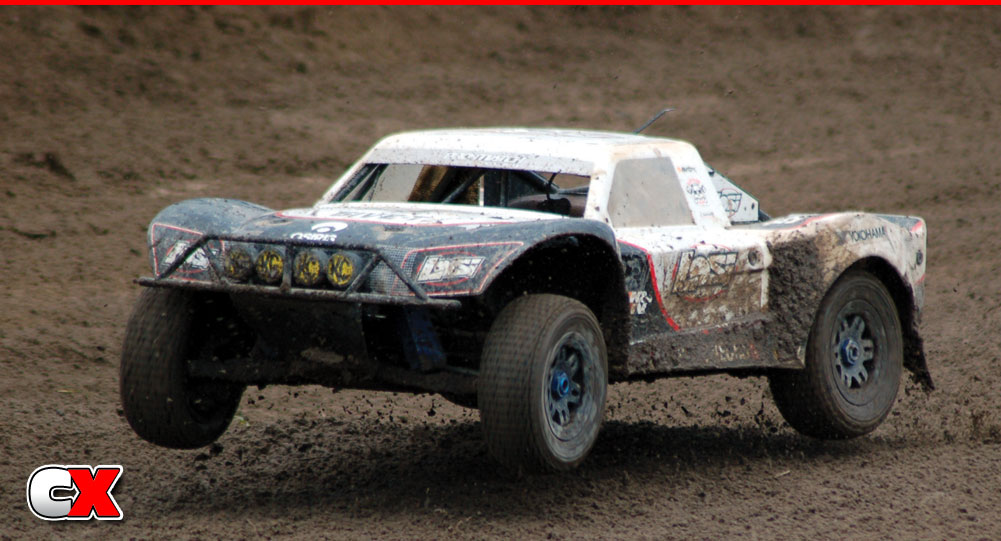
QUALIFYING AND…THE RAIN
Any time you attend an event (especially back East), you risk the chance of rain. The Large Scale Nats were no different. We arrived in North Carolina and had great weather for both Wednesday and Thursday, but the rain gods had a different plan for us and dropped quite a bit of the wet stuff throughout the weekend. A few times the showers were so hard we were wondering if we’d be finishing the mains with 1/5-scale powerboats! Thunder, lightning and high winds all added to the excitement, but in the end there was plenty of time (and light) to get ‘er done.
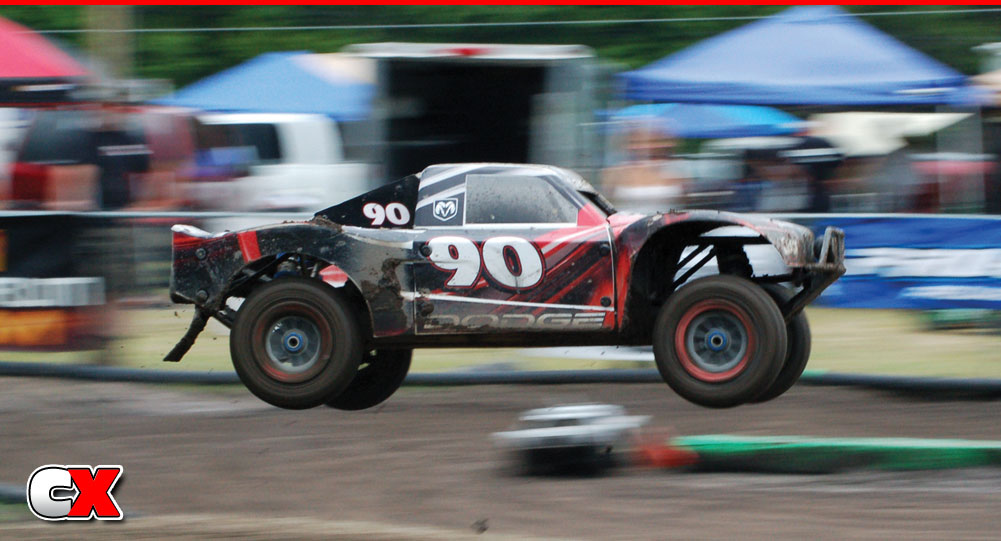
THE FINALS
Every driver had the opportunity to run a main event. Any drivers winning the lower mains had the option to take the win in that main or bump to a higher main; so, if you won the C Main, you could bump and then compete in the B Main. Win the B Main and you could bump and compete in the A Main. Win the A Main and, well, you were a National Champion! As you can about imagine, almost everyone bumped to a higher main with hopes of winning the National title! We did have some rain which made racing a bit more fun to watch (muddy, slippery track equals sliding cars and quite a few turn marshals on their butts!) but in the end the Mains went off without a hitch and National Champions were crowned. Congrats to the winners of all the classes!
WINNERS
2WD Buggy Off Road
1st – Jady Baumgardner
2nd – Travis Mowery
3rd – Laurie Willis Jr.
2WD Truck Offroad
1st – Jady Baumgardner
2nd – Travis Mowery
3rd – Bill Gumbert
4WD Truck Off Road
1st – Josh Howell
2nd – Tony Phalen
3rd – Bill Gumbert
4WD Late Model
1st – Dave Wilt
2nd – Ron Ehrhart
3rd – Mark Frazin
2WD EDM Oval
1st – Tony Phalen
2nd – Donald Stokes
3rd – Jay Baker
2WD Buggy Oval
1st – Jay Magana
2nd – Dave Copeland
3rd – William Chapman
2WD Truck Oval
1st – Travis Mowery
2nd – Jay Magana
3rd – Marty Harrell
4WD Truck Oval
1st – John Schultz
2nd – Jeff Dunn
3rd – Steve Marchione
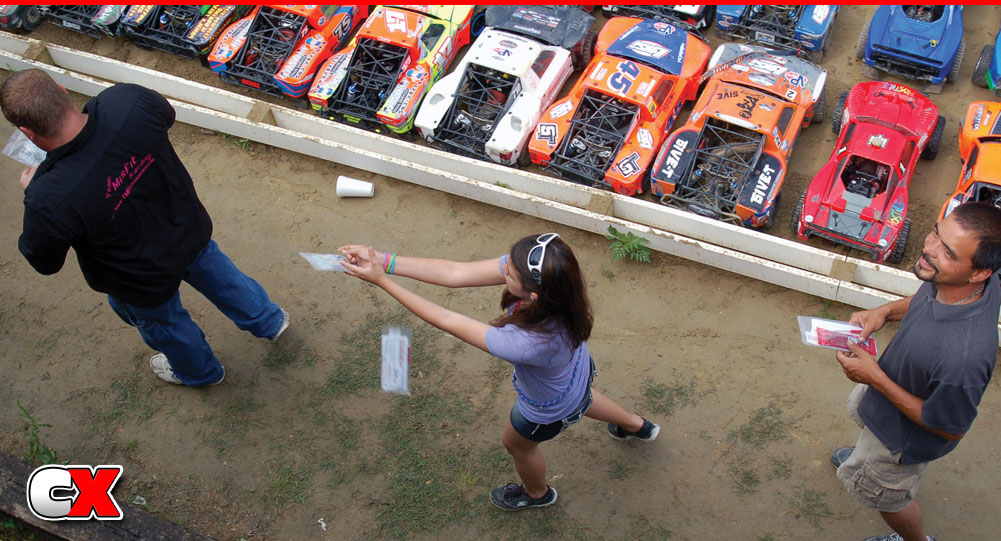
THE SPONSORS
I’ve been to quite a few large-scale events and it always amazes me the support the manufacturers give. There were TONS of prizes given out to the participants. In fact, there were so many prizes we actually had to form a ‘conga line’ that fed right past the driver’s stand. As the drivers walked by, goodies were dropped from the stand down to them. Every person got to go through the line at least three times…figure in over 100 drivers…that’s a lot of prizes! As a participant, I (and I’m sure all the other drivers in attendance) would like to thank the following sponsors for their massive donations: Horizon Hobby, Losi, Spektrum, Dennis Anderson (for the location), DARC Speedway, HPI, RonShop Racing, GBE, DDM, Large Scale RC, Proline Racing, HobbyTown USA, Killer RC, GoFast Racing, Turtle Racing and, of course, RC Driver magazine! I had a great time and will be sure to be back next year.
 CompetitionX CompetitionX is the most up-to-date source for RC Car News, Reviews and Videos for Radio Control. We also have the most comprehensive Manual Database on the web.
CompetitionX CompetitionX is the most up-to-date source for RC Car News, Reviews and Videos for Radio Control. We also have the most comprehensive Manual Database on the web.
























